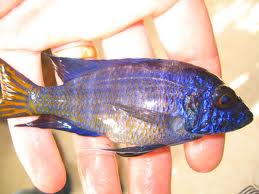Cichlids in general are very hardy fish, especially those from lake Malawi and lake Tanganyika, however they can be susceptible to bloat disease. This is believed to be caused by a flagellate (a unicellular animal, a protozoan) and occurs in all mouth brooding cichlids from the rift valley lakes however normally causes no harm as the fishes immune system can normally cope with it.
In stressful situations this balance of being able to cope with this presence of the flagellate may take it’s toll on the fish and they are unable to fight against it. This can often lead to bloat. The symptoms of cichlid bloat take place in 4 stages and are:
- Fish hides a lot and doesn’t swim around much, it is also not keen at feeding time and if any food is taken in the mouth it is spat back out again.
- The affected cichlid may be appearing to exhale excessively and could almost be likened to coughing.
- The excrement appears to be white in colour and is very long and hangs from the fish for hours.
- The fish will swell up, often to twice the original size and death will shortly follow after this stage although can die before it reaches this stage.
The affects of bloat on your cichlids can be catastrophic and take down a whole colony in a short space of time so it is essential if you are keeping mouth brooding cichlids from lake Malawi, Tanganyika or Victoria to keep treatment on hand at all times. It is also well advised to set up a hospital tank so that you can isolate any fish which appear to be affected as early as possible. This also means that you can treat only affected fish however treating unaffected fish in your main tank should not have any adverse affect on them.

The treatment I would recommend to cure cichlid bloat is most effective in the first stages but can work well at any stage in the process. First thing to do is isolate any affected fish (if you believe it is only isolated to some and not all of your fish) and move them to your hospital tank. The treatment you will need to apply to the fish once isolated contain either metronidazole or dimetridazole. The most commonly available treatment containing metronidazole is Octozin from Waterlife. It is common to use more than the recommended dosage to treat bloat.
I have used 5x dosage of Octozin in the past to treat Malawi bloat and it has had the desired affect and the fish has been cured of bloat after a week of starting treatment, this was also done when the fish was in phase 4 and the eyes were starting to pop so it can help to overdose. Whether the fish would have been cured if I had used the normal dosage, there is no way of telling. There have been instances of treating 10x or even 12x the recommended dosage. It really is down to what you think would be best to ensure the fish is kept under as little stress as possible as well as being sure it is enough to cure the fish of the disease, unfortunately there is no mathematical or logical way of working this out and often comes down to experience and in many cases, trial and error.


Related Posts
A Deeper Look In To Loach Fish Species
How Much Salt Should I Add To My Freshwater Aquarium
Everything You Need To Know About Using T5 Lights For Your Aquarium